Social Studies Essay: Evaluating the Irish Nursing Home Support Scheme
VerifiedAdded on 2022/11/18
|12
|3052
|111
Essay
AI Summary
This essay provides a comprehensive analysis of the Irish Nursing Home Support Scheme (NHSS), also known as the "Fair Deal." It begins by highlighting the vulnerability of the elderly in modern society and the importance of social support and healthcare. The essay then examines the NHSS, detailing its financial assistance model for long-term nursing home care, and its three-tiered structure. It explores the positive impacts of the scheme, such as its universal accessibility for Irish residents and its contribution to the caregiving potential for older adults. However, it also critically evaluates the scheme's shortcomings, including limited funding, financial assessment procedures, and a complex application process. The essay concludes with recommendations for improving the NHSS, such as increased funding allocation, revised financial assessment parameters, and a simplified application process to enhance its effectiveness and better serve its intended beneficiaries. The essay uses multiple references to support its arguments, demonstrating an understanding of the social and economic context of elderly care in Ireland and the role of social policy in addressing these issues.
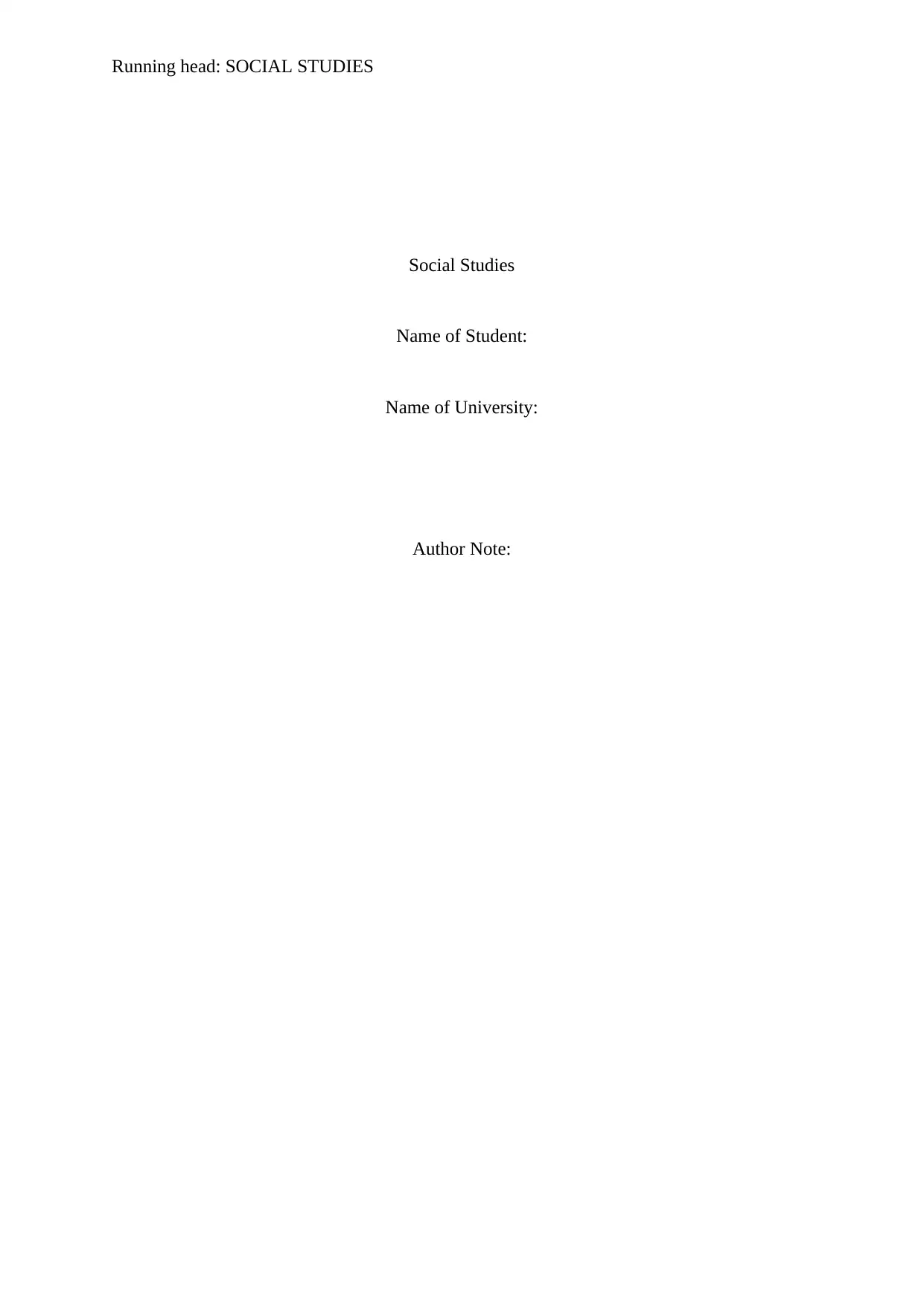
Running head: SOCIAL STUDIES
Social Studies
Name of Student:
Name of University:
Author Note:
Social Studies
Name of Student:
Name of University:
Author Note:
Paraphrase This Document
Need a fresh take? Get an instant paraphrase of this document with our AI Paraphraser
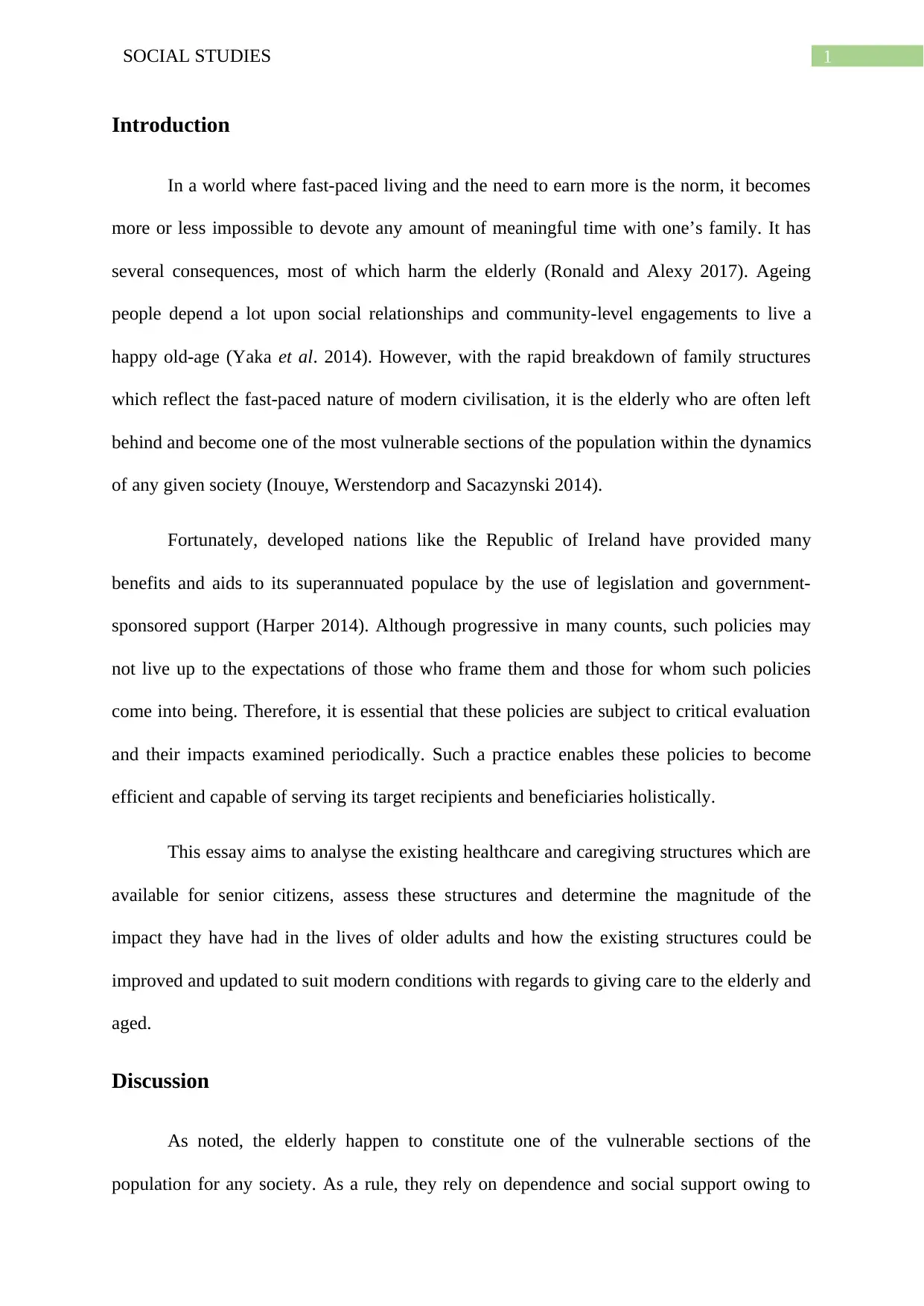
1SOCIAL STUDIES
Introduction
In a world where fast-paced living and the need to earn more is the norm, it becomes
more or less impossible to devote any amount of meaningful time with one’s family. It has
several consequences, most of which harm the elderly (Ronald and Alexy 2017). Ageing
people depend a lot upon social relationships and community-level engagements to live a
happy old-age (Yaka et al. 2014). However, with the rapid breakdown of family structures
which reflect the fast-paced nature of modern civilisation, it is the elderly who are often left
behind and become one of the most vulnerable sections of the population within the dynamics
of any given society (Inouye, Werstendorp and Sacazynski 2014).
Fortunately, developed nations like the Republic of Ireland have provided many
benefits and aids to its superannuated populace by the use of legislation and government-
sponsored support (Harper 2014). Although progressive in many counts, such policies may
not live up to the expectations of those who frame them and those for whom such policies
come into being. Therefore, it is essential that these policies are subject to critical evaluation
and their impacts examined periodically. Such a practice enables these policies to become
efficient and capable of serving its target recipients and beneficiaries holistically.
This essay aims to analyse the existing healthcare and caregiving structures which are
available for senior citizens, assess these structures and determine the magnitude of the
impact they have had in the lives of older adults and how the existing structures could be
improved and updated to suit modern conditions with regards to giving care to the elderly and
aged.
Discussion
As noted, the elderly happen to constitute one of the vulnerable sections of the
population for any society. As a rule, they rely on dependence and social support owing to
Introduction
In a world where fast-paced living and the need to earn more is the norm, it becomes
more or less impossible to devote any amount of meaningful time with one’s family. It has
several consequences, most of which harm the elderly (Ronald and Alexy 2017). Ageing
people depend a lot upon social relationships and community-level engagements to live a
happy old-age (Yaka et al. 2014). However, with the rapid breakdown of family structures
which reflect the fast-paced nature of modern civilisation, it is the elderly who are often left
behind and become one of the most vulnerable sections of the population within the dynamics
of any given society (Inouye, Werstendorp and Sacazynski 2014).
Fortunately, developed nations like the Republic of Ireland have provided many
benefits and aids to its superannuated populace by the use of legislation and government-
sponsored support (Harper 2014). Although progressive in many counts, such policies may
not live up to the expectations of those who frame them and those for whom such policies
come into being. Therefore, it is essential that these policies are subject to critical evaluation
and their impacts examined periodically. Such a practice enables these policies to become
efficient and capable of serving its target recipients and beneficiaries holistically.
This essay aims to analyse the existing healthcare and caregiving structures which are
available for senior citizens, assess these structures and determine the magnitude of the
impact they have had in the lives of older adults and how the existing structures could be
improved and updated to suit modern conditions with regards to giving care to the elderly and
aged.
Discussion
As noted, the elderly happen to constitute one of the vulnerable sections of the
population for any society. As a rule, they rely on dependence and social support owing to
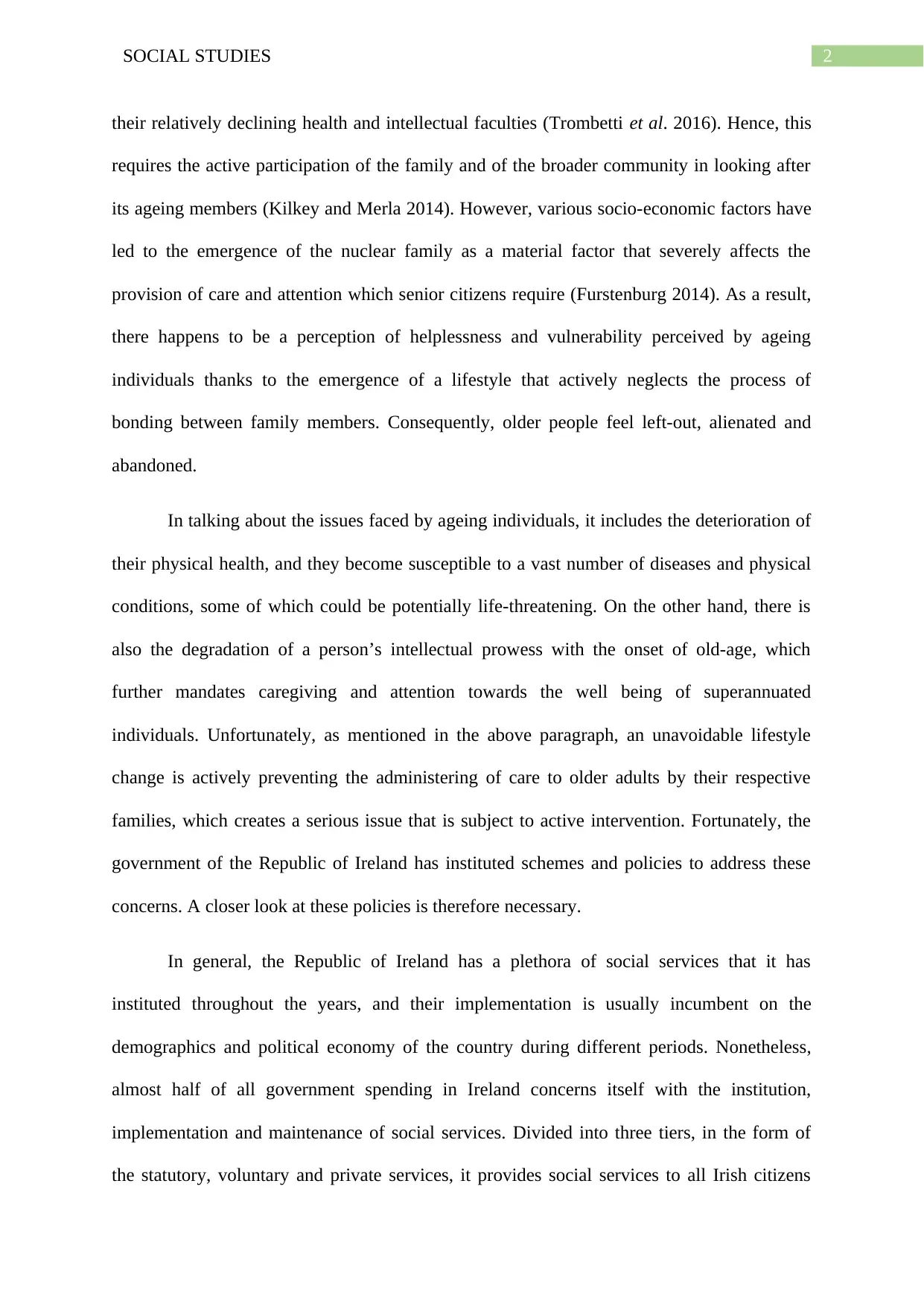
2SOCIAL STUDIES
their relatively declining health and intellectual faculties (Trombetti et al. 2016). Hence, this
requires the active participation of the family and of the broader community in looking after
its ageing members (Kilkey and Merla 2014). However, various socio-economic factors have
led to the emergence of the nuclear family as a material factor that severely affects the
provision of care and attention which senior citizens require (Furstenburg 2014). As a result,
there happens to be a perception of helplessness and vulnerability perceived by ageing
individuals thanks to the emergence of a lifestyle that actively neglects the process of
bonding between family members. Consequently, older people feel left-out, alienated and
abandoned.
In talking about the issues faced by ageing individuals, it includes the deterioration of
their physical health, and they become susceptible to a vast number of diseases and physical
conditions, some of which could be potentially life-threatening. On the other hand, there is
also the degradation of a person’s intellectual prowess with the onset of old-age, which
further mandates caregiving and attention towards the well being of superannuated
individuals. Unfortunately, as mentioned in the above paragraph, an unavoidable lifestyle
change is actively preventing the administering of care to older adults by their respective
families, which creates a serious issue that is subject to active intervention. Fortunately, the
government of the Republic of Ireland has instituted schemes and policies to address these
concerns. A closer look at these policies is therefore necessary.
In general, the Republic of Ireland has a plethora of social services that it has
instituted throughout the years, and their implementation is usually incumbent on the
demographics and political economy of the country during different periods. Nonetheless,
almost half of all government spending in Ireland concerns itself with the institution,
implementation and maintenance of social services. Divided into three tiers, in the form of
the statutory, voluntary and private services, it provides social services to all Irish citizens
their relatively declining health and intellectual faculties (Trombetti et al. 2016). Hence, this
requires the active participation of the family and of the broader community in looking after
its ageing members (Kilkey and Merla 2014). However, various socio-economic factors have
led to the emergence of the nuclear family as a material factor that severely affects the
provision of care and attention which senior citizens require (Furstenburg 2014). As a result,
there happens to be a perception of helplessness and vulnerability perceived by ageing
individuals thanks to the emergence of a lifestyle that actively neglects the process of
bonding between family members. Consequently, older people feel left-out, alienated and
abandoned.
In talking about the issues faced by ageing individuals, it includes the deterioration of
their physical health, and they become susceptible to a vast number of diseases and physical
conditions, some of which could be potentially life-threatening. On the other hand, there is
also the degradation of a person’s intellectual prowess with the onset of old-age, which
further mandates caregiving and attention towards the well being of superannuated
individuals. Unfortunately, as mentioned in the above paragraph, an unavoidable lifestyle
change is actively preventing the administering of care to older adults by their respective
families, which creates a serious issue that is subject to active intervention. Fortunately, the
government of the Republic of Ireland has instituted schemes and policies to address these
concerns. A closer look at these policies is therefore necessary.
In general, the Republic of Ireland has a plethora of social services that it has
instituted throughout the years, and their implementation is usually incumbent on the
demographics and political economy of the country during different periods. Nonetheless,
almost half of all government spending in Ireland concerns itself with the institution,
implementation and maintenance of social services. Divided into three tiers, in the form of
the statutory, voluntary and private services, it provides social services to all Irish citizens
⊘ This is a preview!⊘
Do you want full access?
Subscribe today to unlock all pages.

Trusted by 1+ million students worldwide
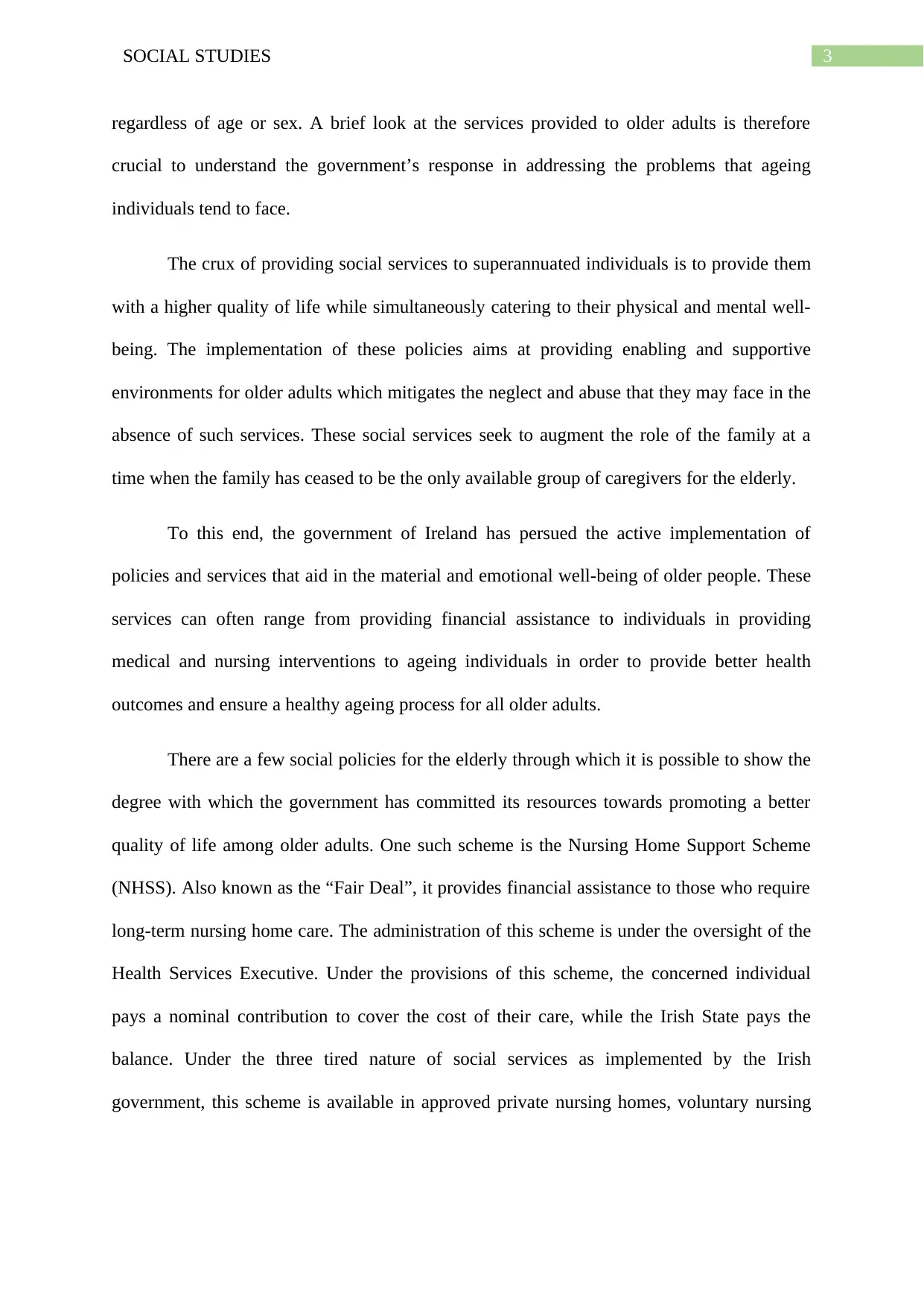
3SOCIAL STUDIES
regardless of age or sex. A brief look at the services provided to older adults is therefore
crucial to understand the government’s response in addressing the problems that ageing
individuals tend to face.
The crux of providing social services to superannuated individuals is to provide them
with a higher quality of life while simultaneously catering to their physical and mental well-
being. The implementation of these policies aims at providing enabling and supportive
environments for older adults which mitigates the neglect and abuse that they may face in the
absence of such services. These social services seek to augment the role of the family at a
time when the family has ceased to be the only available group of caregivers for the elderly.
To this end, the government of Ireland has persued the active implementation of
policies and services that aid in the material and emotional well-being of older people. These
services can often range from providing financial assistance to individuals in providing
medical and nursing interventions to ageing individuals in order to provide better health
outcomes and ensure a healthy ageing process for all older adults.
There are a few social policies for the elderly through which it is possible to show the
degree with which the government has committed its resources towards promoting a better
quality of life among older adults. One such scheme is the Nursing Home Support Scheme
(NHSS). Also known as the “Fair Deal”, it provides financial assistance to those who require
long-term nursing home care. The administration of this scheme is under the oversight of the
Health Services Executive. Under the provisions of this scheme, the concerned individual
pays a nominal contribution to cover the cost of their care, while the Irish State pays the
balance. Under the three tired nature of social services as implemented by the Irish
government, this scheme is available in approved private nursing homes, voluntary nursing
regardless of age or sex. A brief look at the services provided to older adults is therefore
crucial to understand the government’s response in addressing the problems that ageing
individuals tend to face.
The crux of providing social services to superannuated individuals is to provide them
with a higher quality of life while simultaneously catering to their physical and mental well-
being. The implementation of these policies aims at providing enabling and supportive
environments for older adults which mitigates the neglect and abuse that they may face in the
absence of such services. These social services seek to augment the role of the family at a
time when the family has ceased to be the only available group of caregivers for the elderly.
To this end, the government of Ireland has persued the active implementation of
policies and services that aid in the material and emotional well-being of older people. These
services can often range from providing financial assistance to individuals in providing
medical and nursing interventions to ageing individuals in order to provide better health
outcomes and ensure a healthy ageing process for all older adults.
There are a few social policies for the elderly through which it is possible to show the
degree with which the government has committed its resources towards promoting a better
quality of life among older adults. One such scheme is the Nursing Home Support Scheme
(NHSS). Also known as the “Fair Deal”, it provides financial assistance to those who require
long-term nursing home care. The administration of this scheme is under the oversight of the
Health Services Executive. Under the provisions of this scheme, the concerned individual
pays a nominal contribution to cover the cost of their care, while the Irish State pays the
balance. Under the three tired nature of social services as implemented by the Irish
government, this scheme is available in approved private nursing homes, voluntary nursing
Paraphrase This Document
Need a fresh take? Get an instant paraphrase of this document with our AI Paraphraser
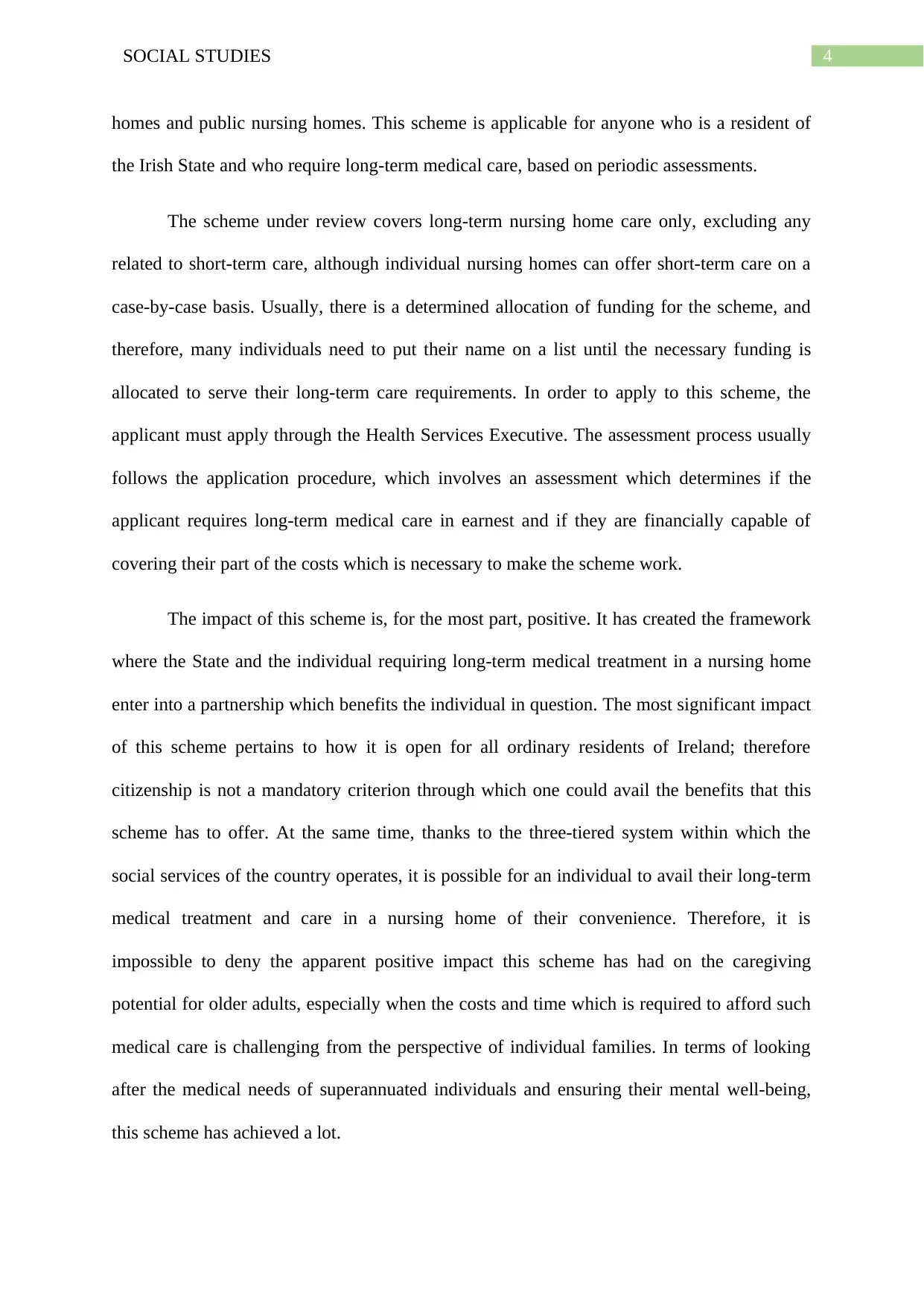
4SOCIAL STUDIES
homes and public nursing homes. This scheme is applicable for anyone who is a resident of
the Irish State and who require long-term medical care, based on periodic assessments.
The scheme under review covers long-term nursing home care only, excluding any
related to short-term care, although individual nursing homes can offer short-term care on a
case-by-case basis. Usually, there is a determined allocation of funding for the scheme, and
therefore, many individuals need to put their name on a list until the necessary funding is
allocated to serve their long-term care requirements. In order to apply to this scheme, the
applicant must apply through the Health Services Executive. The assessment process usually
follows the application procedure, which involves an assessment which determines if the
applicant requires long-term medical care in earnest and if they are financially capable of
covering their part of the costs which is necessary to make the scheme work.
The impact of this scheme is, for the most part, positive. It has created the framework
where the State and the individual requiring long-term medical treatment in a nursing home
enter into a partnership which benefits the individual in question. The most significant impact
of this scheme pertains to how it is open for all ordinary residents of Ireland; therefore
citizenship is not a mandatory criterion through which one could avail the benefits that this
scheme has to offer. At the same time, thanks to the three-tiered system within which the
social services of the country operates, it is possible for an individual to avail their long-term
medical treatment and care in a nursing home of their convenience. Therefore, it is
impossible to deny the apparent positive impact this scheme has had on the caregiving
potential for older adults, especially when the costs and time which is required to afford such
medical care is challenging from the perspective of individual families. In terms of looking
after the medical needs of superannuated individuals and ensuring their mental well-being,
this scheme has achieved a lot.
homes and public nursing homes. This scheme is applicable for anyone who is a resident of
the Irish State and who require long-term medical care, based on periodic assessments.
The scheme under review covers long-term nursing home care only, excluding any
related to short-term care, although individual nursing homes can offer short-term care on a
case-by-case basis. Usually, there is a determined allocation of funding for the scheme, and
therefore, many individuals need to put their name on a list until the necessary funding is
allocated to serve their long-term care requirements. In order to apply to this scheme, the
applicant must apply through the Health Services Executive. The assessment process usually
follows the application procedure, which involves an assessment which determines if the
applicant requires long-term medical care in earnest and if they are financially capable of
covering their part of the costs which is necessary to make the scheme work.
The impact of this scheme is, for the most part, positive. It has created the framework
where the State and the individual requiring long-term medical treatment in a nursing home
enter into a partnership which benefits the individual in question. The most significant impact
of this scheme pertains to how it is open for all ordinary residents of Ireland; therefore
citizenship is not a mandatory criterion through which one could avail the benefits that this
scheme has to offer. At the same time, thanks to the three-tiered system within which the
social services of the country operates, it is possible for an individual to avail their long-term
medical treatment and care in a nursing home of their convenience. Therefore, it is
impossible to deny the apparent positive impact this scheme has had on the caregiving
potential for older adults, especially when the costs and time which is required to afford such
medical care is challenging from the perspective of individual families. In terms of looking
after the medical needs of superannuated individuals and ensuring their mental well-being,
this scheme has achieved a lot.
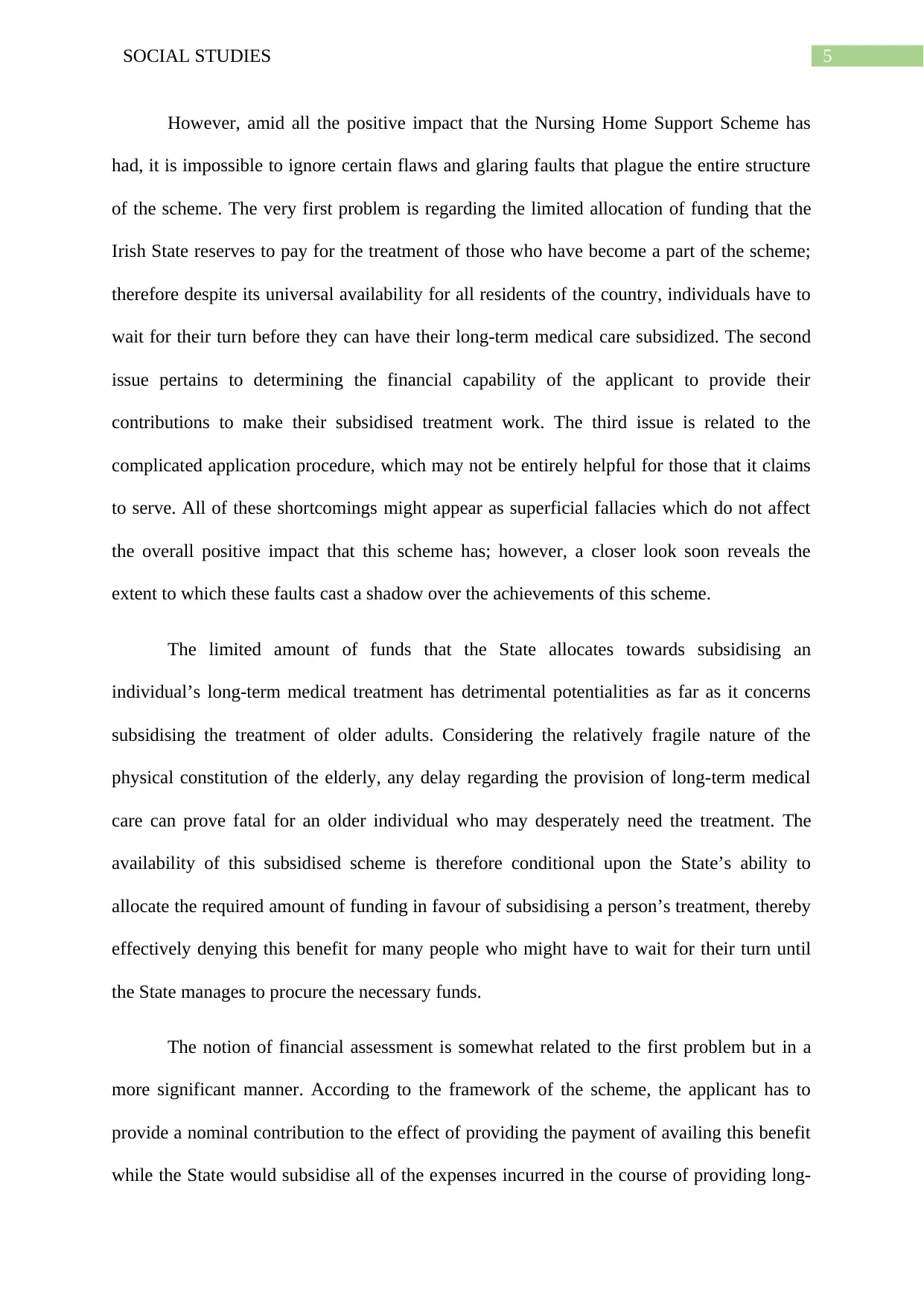
5SOCIAL STUDIES
However, amid all the positive impact that the Nursing Home Support Scheme has
had, it is impossible to ignore certain flaws and glaring faults that plague the entire structure
of the scheme. The very first problem is regarding the limited allocation of funding that the
Irish State reserves to pay for the treatment of those who have become a part of the scheme;
therefore despite its universal availability for all residents of the country, individuals have to
wait for their turn before they can have their long-term medical care subsidized. The second
issue pertains to determining the financial capability of the applicant to provide their
contributions to make their subsidised treatment work. The third issue is related to the
complicated application procedure, which may not be entirely helpful for those that it claims
to serve. All of these shortcomings might appear as superficial fallacies which do not affect
the overall positive impact that this scheme has; however, a closer look soon reveals the
extent to which these faults cast a shadow over the achievements of this scheme.
The limited amount of funds that the State allocates towards subsidising an
individual’s long-term medical treatment has detrimental potentialities as far as it concerns
subsidising the treatment of older adults. Considering the relatively fragile nature of the
physical constitution of the elderly, any delay regarding the provision of long-term medical
care can prove fatal for an older individual who may desperately need the treatment. The
availability of this subsidised scheme is therefore conditional upon the State’s ability to
allocate the required amount of funding in favour of subsidising a person’s treatment, thereby
effectively denying this benefit for many people who might have to wait for their turn until
the State manages to procure the necessary funds.
The notion of financial assessment is somewhat related to the first problem but in a
more significant manner. According to the framework of the scheme, the applicant has to
provide a nominal contribution to the effect of providing the payment of availing this benefit
while the State would subsidise all of the expenses incurred in the course of providing long-
However, amid all the positive impact that the Nursing Home Support Scheme has
had, it is impossible to ignore certain flaws and glaring faults that plague the entire structure
of the scheme. The very first problem is regarding the limited allocation of funding that the
Irish State reserves to pay for the treatment of those who have become a part of the scheme;
therefore despite its universal availability for all residents of the country, individuals have to
wait for their turn before they can have their long-term medical care subsidized. The second
issue pertains to determining the financial capability of the applicant to provide their
contributions to make their subsidised treatment work. The third issue is related to the
complicated application procedure, which may not be entirely helpful for those that it claims
to serve. All of these shortcomings might appear as superficial fallacies which do not affect
the overall positive impact that this scheme has; however, a closer look soon reveals the
extent to which these faults cast a shadow over the achievements of this scheme.
The limited amount of funds that the State allocates towards subsidising an
individual’s long-term medical treatment has detrimental potentialities as far as it concerns
subsidising the treatment of older adults. Considering the relatively fragile nature of the
physical constitution of the elderly, any delay regarding the provision of long-term medical
care can prove fatal for an older individual who may desperately need the treatment. The
availability of this subsidised scheme is therefore conditional upon the State’s ability to
allocate the required amount of funding in favour of subsidising a person’s treatment, thereby
effectively denying this benefit for many people who might have to wait for their turn until
the State manages to procure the necessary funds.
The notion of financial assessment is somewhat related to the first problem but in a
more significant manner. According to the framework of the scheme, the applicant has to
provide a nominal contribution to the effect of providing the payment of availing this benefit
while the State would subsidise all of the expenses incurred in the course of providing long-
⊘ This is a preview!⊘
Do you want full access?
Subscribe today to unlock all pages.

Trusted by 1+ million students worldwide
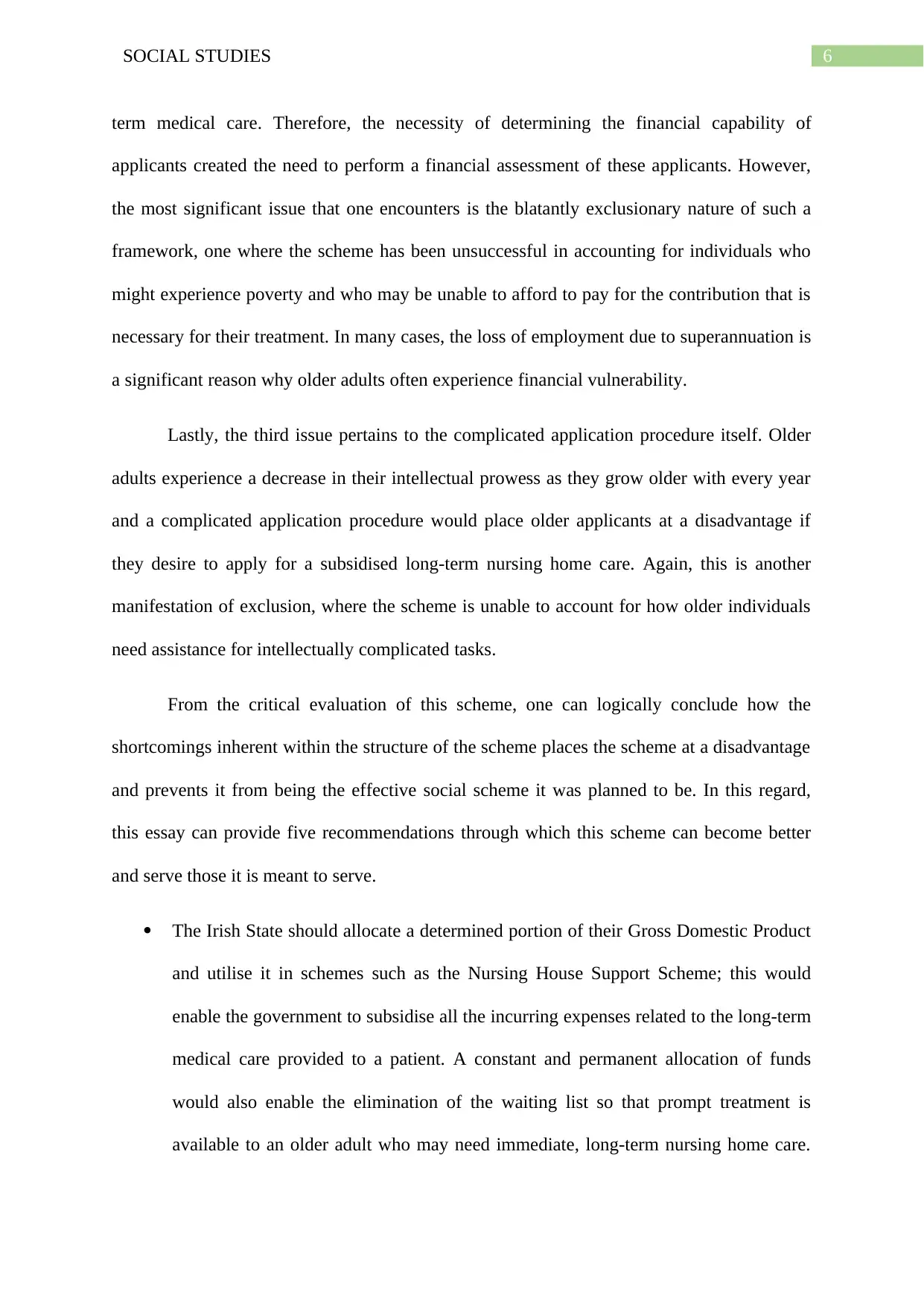
6SOCIAL STUDIES
term medical care. Therefore, the necessity of determining the financial capability of
applicants created the need to perform a financial assessment of these applicants. However,
the most significant issue that one encounters is the blatantly exclusionary nature of such a
framework, one where the scheme has been unsuccessful in accounting for individuals who
might experience poverty and who may be unable to afford to pay for the contribution that is
necessary for their treatment. In many cases, the loss of employment due to superannuation is
a significant reason why older adults often experience financial vulnerability.
Lastly, the third issue pertains to the complicated application procedure itself. Older
adults experience a decrease in their intellectual prowess as they grow older with every year
and a complicated application procedure would place older applicants at a disadvantage if
they desire to apply for a subsidised long-term nursing home care. Again, this is another
manifestation of exclusion, where the scheme is unable to account for how older individuals
need assistance for intellectually complicated tasks.
From the critical evaluation of this scheme, one can logically conclude how the
shortcomings inherent within the structure of the scheme places the scheme at a disadvantage
and prevents it from being the effective social scheme it was planned to be. In this regard,
this essay can provide five recommendations through which this scheme can become better
and serve those it is meant to serve.
The Irish State should allocate a determined portion of their Gross Domestic Product
and utilise it in schemes such as the Nursing House Support Scheme; this would
enable the government to subsidise all the incurring expenses related to the long-term
medical care provided to a patient. A constant and permanent allocation of funds
would also enable the elimination of the waiting list so that prompt treatment is
available to an older adult who may need immediate, long-term nursing home care.
term medical care. Therefore, the necessity of determining the financial capability of
applicants created the need to perform a financial assessment of these applicants. However,
the most significant issue that one encounters is the blatantly exclusionary nature of such a
framework, one where the scheme has been unsuccessful in accounting for individuals who
might experience poverty and who may be unable to afford to pay for the contribution that is
necessary for their treatment. In many cases, the loss of employment due to superannuation is
a significant reason why older adults often experience financial vulnerability.
Lastly, the third issue pertains to the complicated application procedure itself. Older
adults experience a decrease in their intellectual prowess as they grow older with every year
and a complicated application procedure would place older applicants at a disadvantage if
they desire to apply for a subsidised long-term nursing home care. Again, this is another
manifestation of exclusion, where the scheme is unable to account for how older individuals
need assistance for intellectually complicated tasks.
From the critical evaluation of this scheme, one can logically conclude how the
shortcomings inherent within the structure of the scheme places the scheme at a disadvantage
and prevents it from being the effective social scheme it was planned to be. In this regard,
this essay can provide five recommendations through which this scheme can become better
and serve those it is meant to serve.
The Irish State should allocate a determined portion of their Gross Domestic Product
and utilise it in schemes such as the Nursing House Support Scheme; this would
enable the government to subsidise all the incurring expenses related to the long-term
medical care provided to a patient. A constant and permanent allocation of funds
would also enable the elimination of the waiting list so that prompt treatment is
available to an older adult who may need immediate, long-term nursing home care.
Paraphrase This Document
Need a fresh take? Get an instant paraphrase of this document with our AI Paraphraser
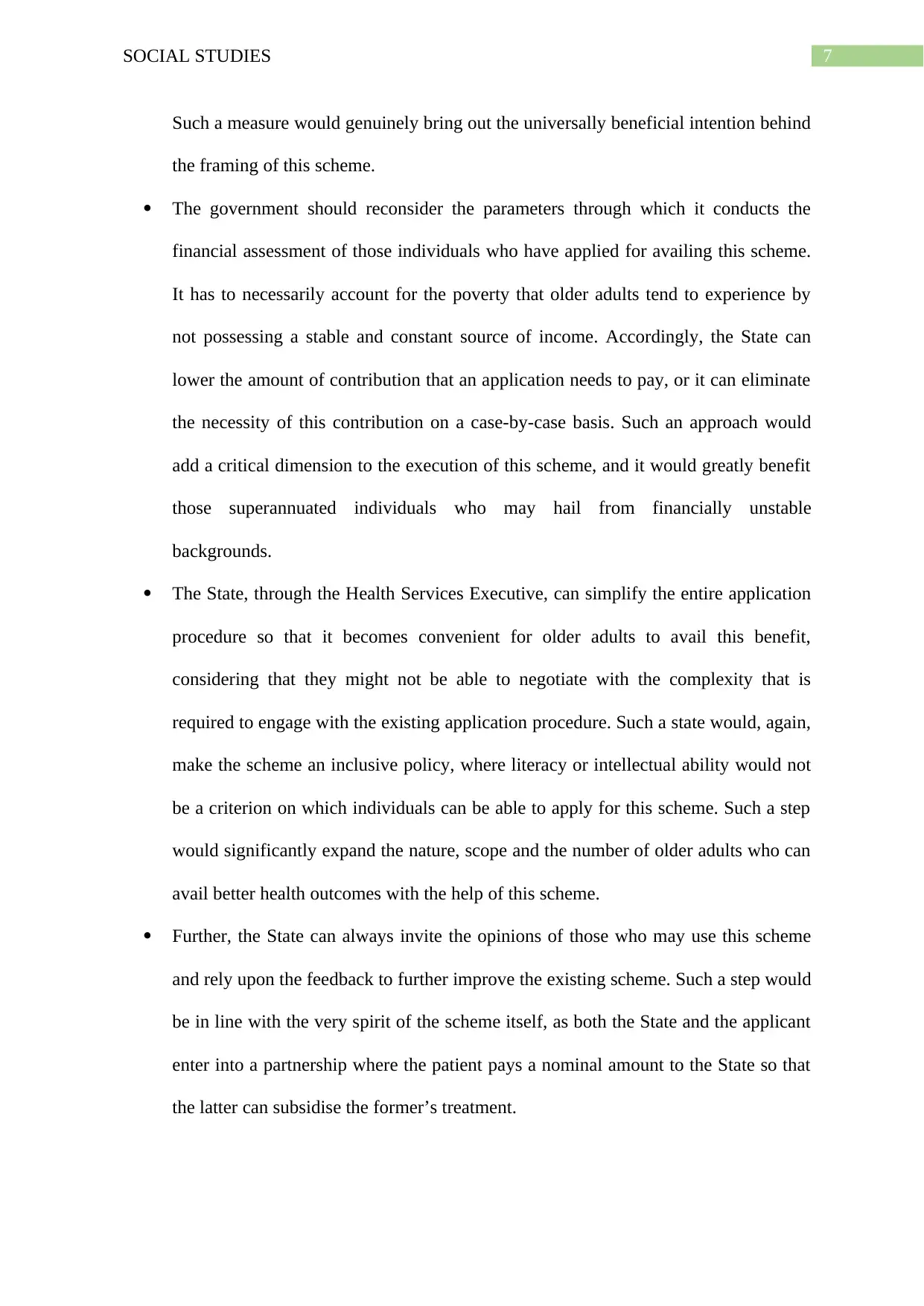
7SOCIAL STUDIES
Such a measure would genuinely bring out the universally beneficial intention behind
the framing of this scheme.
The government should reconsider the parameters through which it conducts the
financial assessment of those individuals who have applied for availing this scheme.
It has to necessarily account for the poverty that older adults tend to experience by
not possessing a stable and constant source of income. Accordingly, the State can
lower the amount of contribution that an application needs to pay, or it can eliminate
the necessity of this contribution on a case-by-case basis. Such an approach would
add a critical dimension to the execution of this scheme, and it would greatly benefit
those superannuated individuals who may hail from financially unstable
backgrounds.
The State, through the Health Services Executive, can simplify the entire application
procedure so that it becomes convenient for older adults to avail this benefit,
considering that they might not be able to negotiate with the complexity that is
required to engage with the existing application procedure. Such a state would, again,
make the scheme an inclusive policy, where literacy or intellectual ability would not
be a criterion on which individuals can be able to apply for this scheme. Such a step
would significantly expand the nature, scope and the number of older adults who can
avail better health outcomes with the help of this scheme.
Further, the State can always invite the opinions of those who may use this scheme
and rely upon the feedback to further improve the existing scheme. Such a step would
be in line with the very spirit of the scheme itself, as both the State and the applicant
enter into a partnership where the patient pays a nominal amount to the State so that
the latter can subsidise the former’s treatment.
Such a measure would genuinely bring out the universally beneficial intention behind
the framing of this scheme.
The government should reconsider the parameters through which it conducts the
financial assessment of those individuals who have applied for availing this scheme.
It has to necessarily account for the poverty that older adults tend to experience by
not possessing a stable and constant source of income. Accordingly, the State can
lower the amount of contribution that an application needs to pay, or it can eliminate
the necessity of this contribution on a case-by-case basis. Such an approach would
add a critical dimension to the execution of this scheme, and it would greatly benefit
those superannuated individuals who may hail from financially unstable
backgrounds.
The State, through the Health Services Executive, can simplify the entire application
procedure so that it becomes convenient for older adults to avail this benefit,
considering that they might not be able to negotiate with the complexity that is
required to engage with the existing application procedure. Such a state would, again,
make the scheme an inclusive policy, where literacy or intellectual ability would not
be a criterion on which individuals can be able to apply for this scheme. Such a step
would significantly expand the nature, scope and the number of older adults who can
avail better health outcomes with the help of this scheme.
Further, the State can always invite the opinions of those who may use this scheme
and rely upon the feedback to further improve the existing scheme. Such a step would
be in line with the very spirit of the scheme itself, as both the State and the applicant
enter into a partnership where the patient pays a nominal amount to the State so that
the latter can subsidise the former’s treatment.
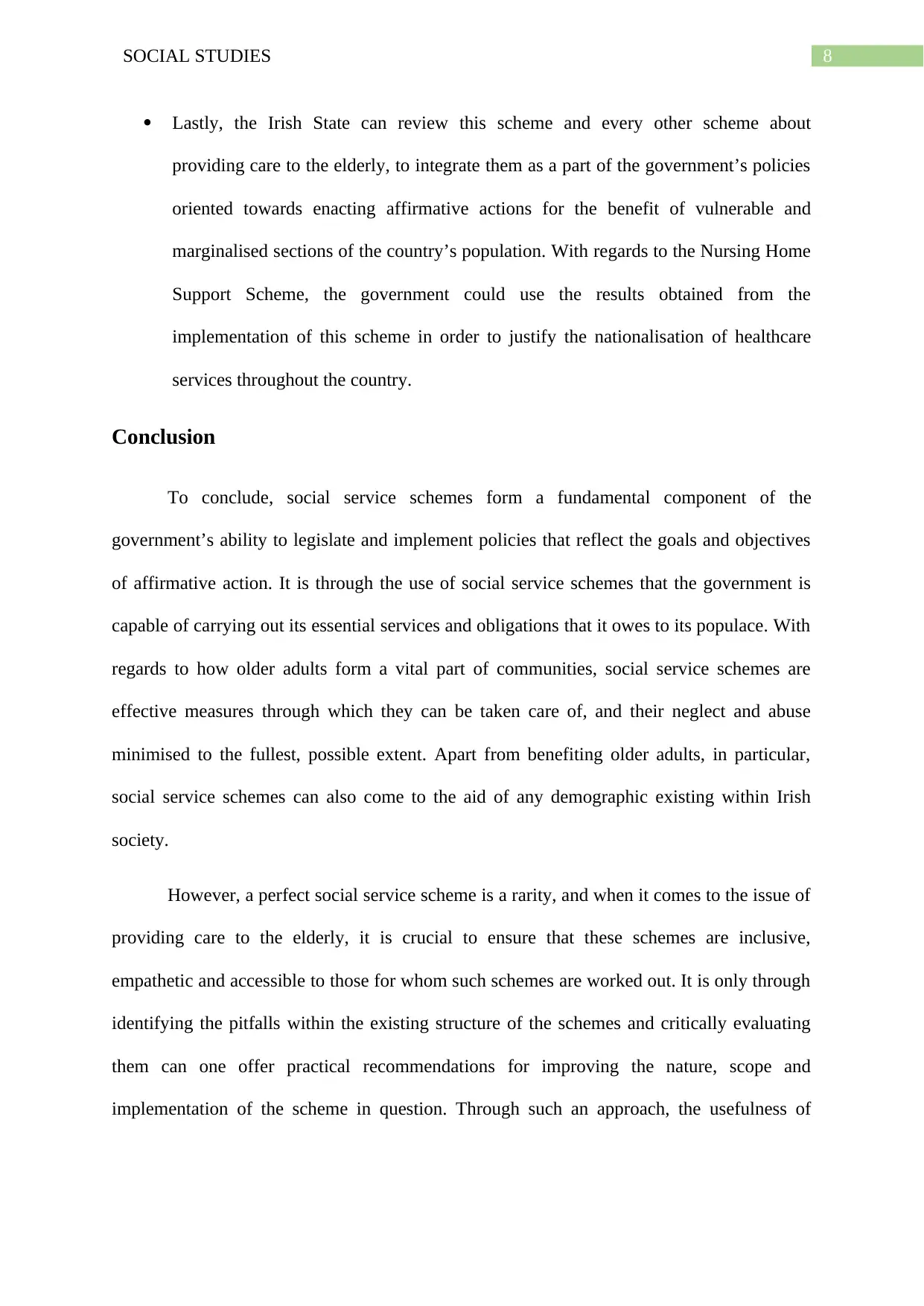
8SOCIAL STUDIES
Lastly, the Irish State can review this scheme and every other scheme about
providing care to the elderly, to integrate them as a part of the government’s policies
oriented towards enacting affirmative actions for the benefit of vulnerable and
marginalised sections of the country’s population. With regards to the Nursing Home
Support Scheme, the government could use the results obtained from the
implementation of this scheme in order to justify the nationalisation of healthcare
services throughout the country.
Conclusion
To conclude, social service schemes form a fundamental component of the
government’s ability to legislate and implement policies that reflect the goals and objectives
of affirmative action. It is through the use of social service schemes that the government is
capable of carrying out its essential services and obligations that it owes to its populace. With
regards to how older adults form a vital part of communities, social service schemes are
effective measures through which they can be taken care of, and their neglect and abuse
minimised to the fullest, possible extent. Apart from benefiting older adults, in particular,
social service schemes can also come to the aid of any demographic existing within Irish
society.
However, a perfect social service scheme is a rarity, and when it comes to the issue of
providing care to the elderly, it is crucial to ensure that these schemes are inclusive,
empathetic and accessible to those for whom such schemes are worked out. It is only through
identifying the pitfalls within the existing structure of the schemes and critically evaluating
them can one offer practical recommendations for improving the nature, scope and
implementation of the scheme in question. Through such an approach, the usefulness of
Lastly, the Irish State can review this scheme and every other scheme about
providing care to the elderly, to integrate them as a part of the government’s policies
oriented towards enacting affirmative actions for the benefit of vulnerable and
marginalised sections of the country’s population. With regards to the Nursing Home
Support Scheme, the government could use the results obtained from the
implementation of this scheme in order to justify the nationalisation of healthcare
services throughout the country.
Conclusion
To conclude, social service schemes form a fundamental component of the
government’s ability to legislate and implement policies that reflect the goals and objectives
of affirmative action. It is through the use of social service schemes that the government is
capable of carrying out its essential services and obligations that it owes to its populace. With
regards to how older adults form a vital part of communities, social service schemes are
effective measures through which they can be taken care of, and their neglect and abuse
minimised to the fullest, possible extent. Apart from benefiting older adults, in particular,
social service schemes can also come to the aid of any demographic existing within Irish
society.
However, a perfect social service scheme is a rarity, and when it comes to the issue of
providing care to the elderly, it is crucial to ensure that these schemes are inclusive,
empathetic and accessible to those for whom such schemes are worked out. It is only through
identifying the pitfalls within the existing structure of the schemes and critically evaluating
them can one offer practical recommendations for improving the nature, scope and
implementation of the scheme in question. Through such an approach, the usefulness of
⊘ This is a preview!⊘
Do you want full access?
Subscribe today to unlock all pages.

Trusted by 1+ million students worldwide

9SOCIAL STUDIES
social service schemes would find more extensive use and would have a significant impact on
providing care to senior citizens.
social service schemes would find more extensive use and would have a significant impact on
providing care to senior citizens.
Paraphrase This Document
Need a fresh take? Get an instant paraphrase of this document with our AI Paraphraser
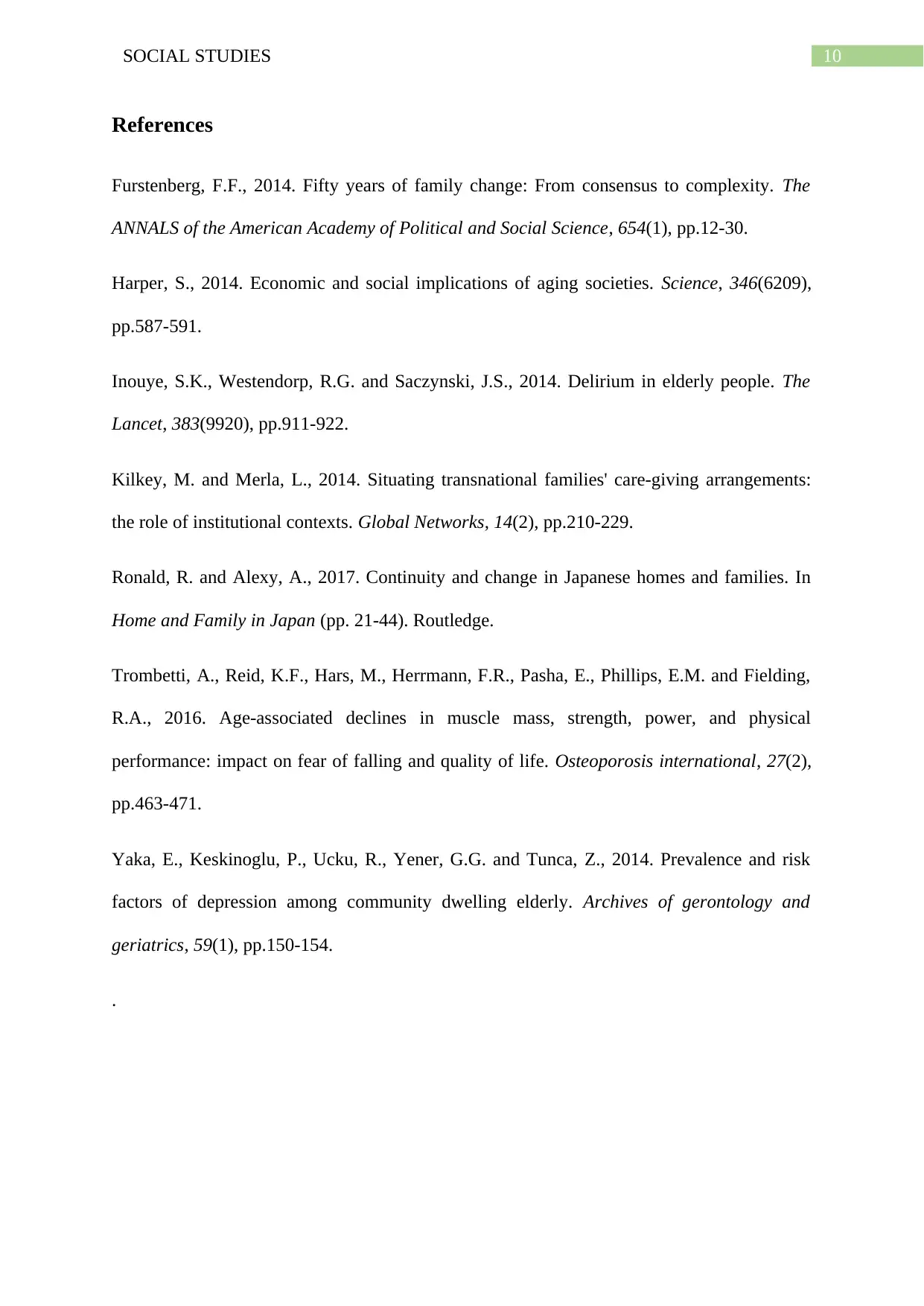
10SOCIAL STUDIES
References
Furstenberg, F.F., 2014. Fifty years of family change: From consensus to complexity. The
ANNALS of the American Academy of Political and Social Science, 654(1), pp.12-30.
Harper, S., 2014. Economic and social implications of aging societies. Science, 346(6209),
pp.587-591.
Inouye, S.K., Westendorp, R.G. and Saczynski, J.S., 2014. Delirium in elderly people. The
Lancet, 383(9920), pp.911-922.
Kilkey, M. and Merla, L., 2014. Situating transnational families' care‐giving arrangements:
the role of institutional contexts. Global Networks, 14(2), pp.210-229.
Ronald, R. and Alexy, A., 2017. Continuity and change in Japanese homes and families. In
Home and Family in Japan (pp. 21-44). Routledge.
Trombetti, A., Reid, K.F., Hars, M., Herrmann, F.R., Pasha, E., Phillips, E.M. and Fielding,
R.A., 2016. Age-associated declines in muscle mass, strength, power, and physical
performance: impact on fear of falling and quality of life. Osteoporosis international, 27(2),
pp.463-471.
Yaka, E., Keskinoglu, P., Ucku, R., Yener, G.G. and Tunca, Z., 2014. Prevalence and risk
factors of depression among community dwelling elderly. Archives of gerontology and
geriatrics, 59(1), pp.150-154.
.
References
Furstenberg, F.F., 2014. Fifty years of family change: From consensus to complexity. The
ANNALS of the American Academy of Political and Social Science, 654(1), pp.12-30.
Harper, S., 2014. Economic and social implications of aging societies. Science, 346(6209),
pp.587-591.
Inouye, S.K., Westendorp, R.G. and Saczynski, J.S., 2014. Delirium in elderly people. The
Lancet, 383(9920), pp.911-922.
Kilkey, M. and Merla, L., 2014. Situating transnational families' care‐giving arrangements:
the role of institutional contexts. Global Networks, 14(2), pp.210-229.
Ronald, R. and Alexy, A., 2017. Continuity and change in Japanese homes and families. In
Home and Family in Japan (pp. 21-44). Routledge.
Trombetti, A., Reid, K.F., Hars, M., Herrmann, F.R., Pasha, E., Phillips, E.M. and Fielding,
R.A., 2016. Age-associated declines in muscle mass, strength, power, and physical
performance: impact on fear of falling and quality of life. Osteoporosis international, 27(2),
pp.463-471.
Yaka, E., Keskinoglu, P., Ucku, R., Yener, G.G. and Tunca, Z., 2014. Prevalence and risk
factors of depression among community dwelling elderly. Archives of gerontology and
geriatrics, 59(1), pp.150-154.
.

11SOCIAL STUDIES
.
.
⊘ This is a preview!⊘
Do you want full access?
Subscribe today to unlock all pages.

Trusted by 1+ million students worldwide
1 out of 12
Related Documents
Your All-in-One AI-Powered Toolkit for Academic Success.
+13062052269
info@desklib.com
Available 24*7 on WhatsApp / Email
![[object Object]](/_next/static/media/star-bottom.7253800d.svg)
Unlock your academic potential
Copyright © 2020–2026 A2Z Services. All Rights Reserved. Developed and managed by ZUCOL.





